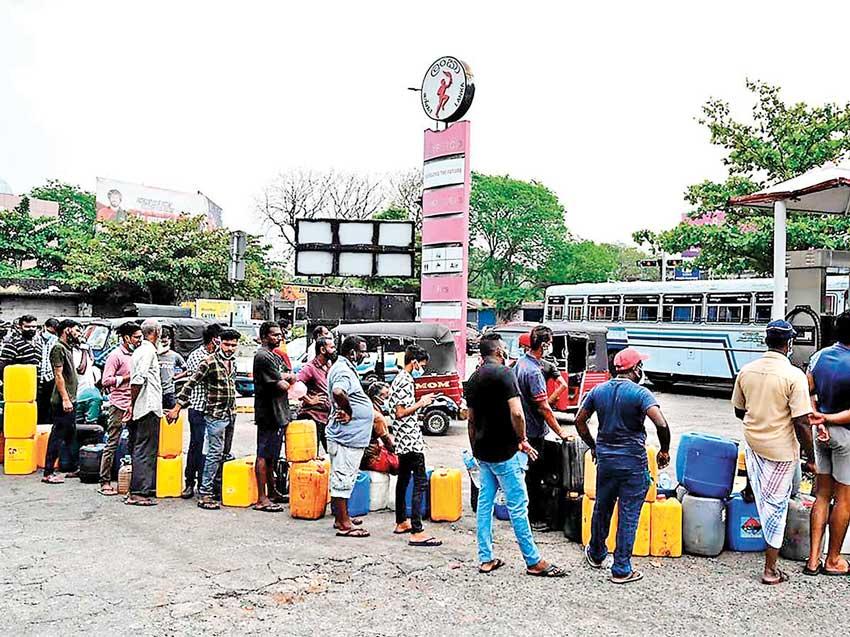Reply To:
Name - Reply Comment
Last Updated : 2024-04-26 15:05:00

Still, Sri Lanka keeps its fingers crossed that India will offer another credit line to purchase fuel
What Sri Lanka witnesses at present is nothing but a dire predicament leaving it within little option when reaching out to the rest of the world for help
Relations with China have soured a lot, and it is not in agreement with Sri Lanka striking an arrangement with the IMF
 Sri Lanka, as a country geo-strategically located, is always required to walk the diplomatic tightrope. The task becomes easy if it is on a sound economic, political and social footing. So to speak, the more the country realises its indigenous potential, the easier it is to deal with the rest of the world; where relations are mostly transactional in nature. If any country can stand on its own feet, it can deal with other countries without compromise on its interests.
Sri Lanka, as a country geo-strategically located, is always required to walk the diplomatic tightrope. The task becomes easy if it is on a sound economic, political and social footing. So to speak, the more the country realises its indigenous potential, the easier it is to deal with the rest of the world; where relations are mostly transactional in nature. If any country can stand on its own feet, it can deal with other countries without compromise on its interests.
What Sri Lanka witnesses at present is nothing but a dire predicament leaving it within little option when reaching out to the rest of the world for help. The economic crisis that started off with the pandemic snowballed into epic proportion coupled with political and social unrest. The country runs short of foreign exchange and uncertainty looms when the next shipment of fuel will arrive in the country. The meager stock of currently available fuel is released only for essential services.
Any workable solution can be found only with international, bilateral and multi-lateral cooperation to redress immediate concerns of the general public. The countries have offered to help, and a big deal is on the way. Well, there is no such thing as a free lunch. Assistance from four major countries-the United States, China, India and Japan- is possible in evolving the trajectory to resuscitate the country from this abyss. All of them have varying geo-political interests in the region, and Sri Lanka matters to them a lot, no doubt.
When the signs of the present economic downfall emerged way back, the government was urged by different parties and entities to work out an arrangement with the International Monetary Fund (IMF) and restructure its debt repayment plan in consultation with bond holders. The government hemmed and hawed over it for more than one year until President Gotabaya Rajapaksa announced such negotiations with the IMF in March, 2022 in the nick of time. Sri Lanka’s decision is backed by the United States, India and Japan - key countries that have obvious strategic interests in the region.
An IMF delegation arrived in the country last week for talks on a bailout programme. It was followed by a team of U.S. treasury officials who landed in the country last Sunday for talks on the current situation to decide on economic assistance. The US and the IMF work in tandem with each other.
Robert Kaproth, Deputy Assistant Secretary of the Treasury for Asia in the United States, led the delegation and held talks with the president and Prime Minister Ranil Wickremesinghe last Monday. According to a statement from the prime minister’s office, the U.S. agreed to offer technical assistance for fiscal management.
In securing a deal with the IMF, India is fully behind Sri Lanka. Already, India has offered assistance amounting to more than US $ 5 billion during the current crisis period. Still, Sri Lanka keeps its fingers crossed that India will offer another credit line to purchase fuel. In addition, the Sri Lankan government is planning to purchase four shipments of fuel on cash payment terms.
As a country now left with few choices, Sri Lanka is now in contact with the IMF in anticipation of conclusion of staff level arrangement to secure multi- billion dollar assistance to get over the crisis. In broader geopolitical perspective, the interests of the IMF, India, Japan and the U.S. merge. Countering China is key among them. Sri Lanka’s pronounced foreign policy of neutrality is now unworkable since the country, sagging under the weight of economic hardships, has all but limited choices.
Well, there is no such thing as a free lunch. Assistance from four major countries-the United States, China, India and Japan- is possible in evolving the trajectory to resuscitate the country from this abyss. All of them have varying geo-political interests in the region, and Sri Lanka matters to them a lot, no doubt
It is extremely difficult for the government to strike a balance in its foreign relations, especially in economic diplomacy.
In its preparation to go for an understanding with the IMF, Sri Lanka defaulted foreign debt payment – US $ 7 billion due this year alone. It affected its ties on the economic front with China. Most people believed Sri Lanka would lean more towards China under the current Rajapaksa rule, but the exact opposite appeared to have taken place. Relations with China have soured a lot, and it is not in agreement with Sri Lanka striking an arrangement with the IMF.
Sri Lanka is scheduled to make debt payments amounting nearly US $ 1 billion to the Chinese banks this year. Sri Lanka’s move for default stands in the way of future financial cooperation with China.
But, as a country, there is nothing much Sri Lanka can do now in this regard because it has limited options. An IMF deal is the only way out given the depth of the crisis. Be that as it may, it is bound to come at a cost because the government is no longer in a position for hard negotiations in any deal with any of the countries or multi-lateral lenders. That is the tragedy common to any country when it is on a position of weakness. India has come in a big way with a package to help Sri Lanka. If not for Indian assistance with fuel supplies on credit, Sri Lanka’s situation would have been even worse.Now, the stage is set for greater connectivity with Indian economy.
During talks with the recent delegation of high ranking Indian officials, the attention was paid more on investments from India. India is keen to invest in the energy, particularly in solar and wind power sectors eventually leading to grid connectivity between the two countries. Expedition of work on the west container terminal of the Colombo port is yet another matter highlighted.
Most of these projects remained in the pipeline for a long time. Sri Lanka is now required to take prior action, sometimes budging from its previous positions on them over strategic concerns.
Above all, it is now feared whether social unrest will reach tipping point once again leading to disequilibrium. If that is the case, things will be more and more chaotic worsening economic crisis. The government does not have much space to be granting wishes in this regard.

Add comment
Comments will be edited (grammar, spelling and slang) and authorized at the discretion of Daily Mirror online. The website also has the right not to publish selected comments.
Reply To:
Name - Reply Comment
US authorities are currently reviewing the manifest of every cargo aboard MV
On March 26, a couple arriving from Thailand was arrested with 88 live animal
According to villagers from Naula-Moragolla out of 105 families 80 can afford
Is the situation in Sri Lanka so grim that locals harbour hope that they coul